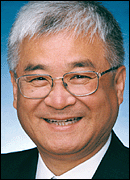

![]()
Pacific Perspective


![]()
Pacific Perspective
Indonesian capital reforms
As the Asian financial crisis deepened in September 1997, the Indonesian government eliminated 49 percent of foreign ownership restrictions on listed companies in the Jakarta and Surabaya stock exchanges to stop capital outflows from its financial system. Foreign investors can now buy up to 100 percent of outstanding shares, including those in banking institutions.
However, foreigners have not been active in the market. By the end of June, foreign ownership was less than 10 percent of total outstanding shares. In addition, foreign investor-initiated trading volume declined from 70 percent in 1994 to only 5 percent to 6 percent even though the Indonesian stock market is the best performer in Asia, with a 30 percent return as of June.
Currently, numerous reform programs are being implemented by the Indonesian Capital Market Supervisory Agency (or better known as BAPEPAM, which is equivalent to the U.S. Securities and Exchange Commission), local stock exchanges, and clearing and settlement institutions to improve market infrastructure.
The introduction of a scripless trading system, implementation of a remote trading and online trading system that enables securities companies to reach investors in the remote areas as well as other countries, and adoption of the principles of good corporate governance system among listed companies are all being undertaken. The stock exchange is under way to transform the exchanges from mutual organizations owned by member brokers to a profit-oriented stock-holding company.
However, in the midst of all these reform programs, simple and fundamental problems are overlooked. For example, although local stock exchanges were privatized and became self-regulatory organizations in 1993, their annual budget plans and the appointment of their president and directors have to be approved by BAPEPAM. This practice is detrimental to the independence and autonomy of the stock exchanges and other self-regulatory organizations. As a result, little has changed because the system is embedded too deeply to be corrected.
Looking at BAPEPAM's operation, unlike market regulatory agencies in other countries, no board of commissioners is in place as a sounding board for its chairman. As a unit of the Ministry of Finance, the BAPEPAM chairman reports to the minister and BAPEPAM's operation is funded by the government budget. The legal status of BAPEPAM, however, may be a critical factor in transforming various self-regulatory organizations to truly autonomous organizations.
The independence of BAP-EPAM must come first. To make BAPEPAM independent, it must be changed to an autonomous market regulator apart from the Ministry of Finance. BAPEPAM's operational budget should be fully supported by securities transaction fees rather than the government budget and the governance of BAPEPAM must be redesigned to ascertain its political independence. A board of commissioners should be created as a policy-making body and more than one-half of the commissioners must be recruited from the private sector securities industry.
S. Ghon Rhee is the K.J. Luke Distinguished Professor of International Finance and Banking at the University of Hawaii. He can be reached e-mail: rheesg@hawaii.edu.